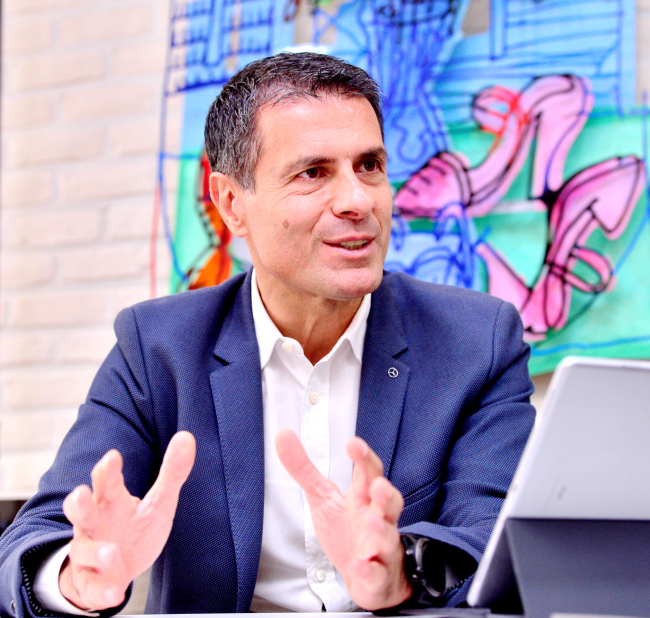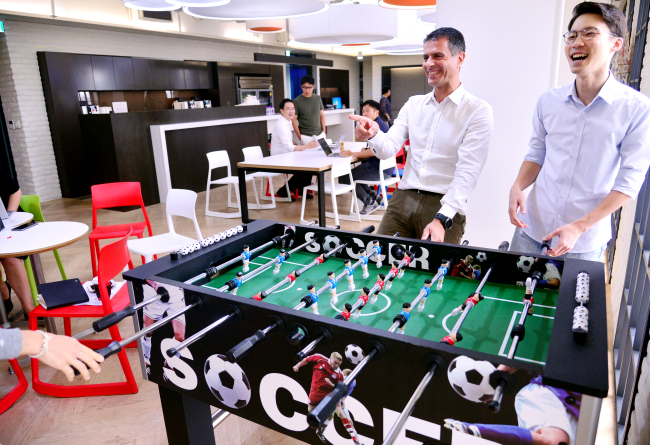The Korea Herald is publishing a series of features and interviews on South Korea’s business environment for foreign companies and investors. This is the tenth installment. -- Ed.
Korea’s discipline-oriented work culture was an important factor in the nation’s impressive growth, but now it needs to give way in favor of creativity and flexibility as the country becomes more all-inclusive in terms of industries and cultures, according to a representative of European companies doing business here.
“The miracles of Korea could not have been achieved without the working attitude of Koreans, who are very disciplined and loyal to (their) companies,” said Dimitris Psillakis, CEO of Mercedes-Benz Korea and chairman of the European Chamber of Commerce in Korea, in an interview with The Korea Herald.
He was referring to the period of rapid economic growth that followed the Korean War (1950-53), during which South Korea miraculously transformed itself from a poor country into the world’s 11th-largest economy and its fifth-largest exporter.
 |
Dimitris Psillakis, CEO of Mercedes-Benz Korea and chairman of the European Chamber of Commerce in Korea (Park Hyun-koo/The Korea Herald) |
“Such traits helped companies develop faster and deliver their goals in the past. But the extremely hierarchical corporate culture now needs to be improved as Korea is more open toward the outside world,” Psillakis said.
Many Korean employees are extremely deferential to their bosses, having learned that part of the culture from family, school and military life. Respecting a strict hierarchy is seen as a way to complete tasks more quickly, but critics say it leads to inefficiency at work by hindering younger employees from directly contributing to the achievements of a business.
According to a 2016 McKinsey survey of about 40,000 employees throughout the world, Korea’s work culture got some of the worst evaluations due to “frequent overtime working, inefficient meetings, excessive reporting to boss and one-sided instruction.” When the research institution surveyed about 2,000 Koreans this year, asking many of the same questions, 88 percent of the respondents said the work culture had not improved significantly.
At work, Koreans usually address their bosses by a title indicating rank, followed by the honorific suffix “nim” as a way of showing respect.
“While I was working for the first six months here, no one called me either Dimitris or Psillakis. All of them called me ‘Sajang-nim.’ I thought nobody knew my name,” recalled Psillakis, who moved to the Korean office in September 2015. “Sajang” means “president” in Korean.
He believes this vertical culture at work often leads to inefficiency and hinders communication.
“When we had a meeting, I found the one who actually worked on the project did not make a presentation. It was always the boss or the boss of the boss,” the CEO said.
 |
Dimitris Psillakis (left), CEO of Mercedes-Benz Korea, plays soccer with his team in a recreational area at the company’s headquarters in Seoul. (Park Hyun-koo/The Korea Herald) |
Even when there was a question from the management about the presentation, the employee with the most knowledge about the project did not speak up, but instead would wait for a signal from his or her immediate supervisor, he said.
“Why don’t they speak up? It seemed because they have to respect their boss and get approval from them,” Psillakis said.
The CEO has his mind set on changing that rigid culture during his tenure here, and on the adoption of a more horizontal human resource system.
“After a year of internal discussion, we decided to call and email each other with our first name. Together, we adopted meritocratic system so that anyone can move up or make a career jump based on individual performance,” he said.
The company also did away with its ranking system for employees below the executive level, who previously held titles to signify which of four ranks they had attained.
Increasingly, Korean companies, particularly those dedicated to technology such as Samsung Electronics, Naver, Kakao, CJ, SK Telecom, Amorepacific and Nexon, are adopting similar systems with the goal of fostering a more horizontal and creative work culture.
A year after the adoption of such a system at Benz, reviews from employees have been mixed.
On the positive side, the CEO’s assistant and driver no longer call him “Sajang-nim,” but instead use his first name, “Dimitri.” Presentations are not always delivered by a vice president or director. People whose participation is unnecessary no longer have to attend meetings just to “fill the seats.” Employees are becoming more proactive about seeking promotions.
But there have been challenges too. Employees who had attained higher ranks but suddenly found themselves on a level playing field with entry-level staff members expressed discontent when the firm flattened the hierarchy.
Other Korean companies, including Posco, KT and Hanwha, have experimented with nonhierarchical systems but returned to their old ways because employees found it difficult to adapt to the changes -- for example, complaining that they led to confusion in dealings with clients and partner companies.
“Not everything is shiny yet,” the CEO said, but he still holds out hope of improving the work culture, believing “personality -- not the position -- gives you value” and “reducing hierarchy makes employees more active, ‘fighting’ and hungrier for development.”
By Shin Ji-hye (
shinjh@heraldcorp.com)





![[Today’s K-pop] Blackpink’s Jennie, Lisa invited to Coachella as solo acts](http://res.heraldm.com/phpwas/restmb_idxmake.php?idx=644&simg=/content/image/2024/11/21/20241121050099_0.jpg)



